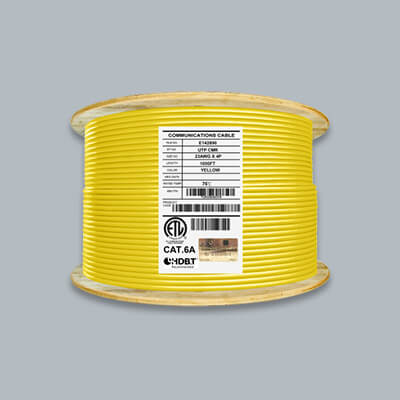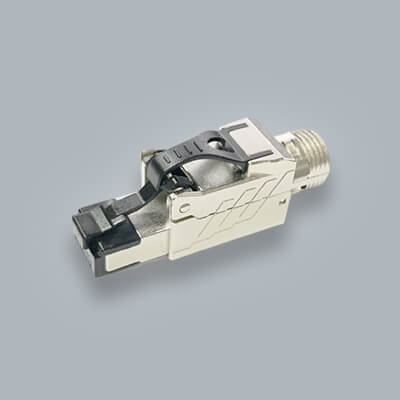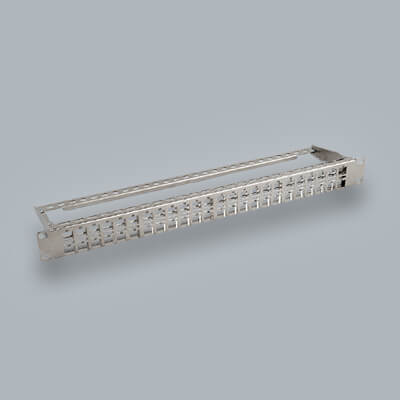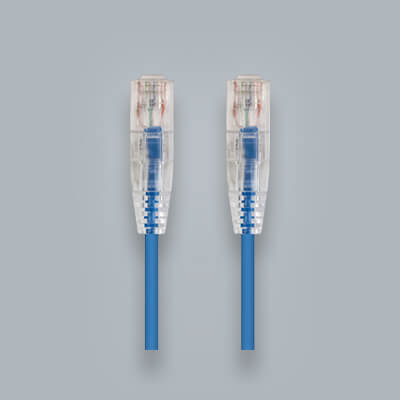Difference between Cat5e and Cat6 Cable?

There are over 5 different cable categories in the world today. Those range from Cat5e to the newly added Cat8 cable. You might even still see Cat3 cable but with the advances in today's technology, it is unlikely. In this article we are going to go over information regarding the difference between Cat5e and Cat6 Cable. Learn about the different types, performance and capabilities of these two categories.
Type Of Cables For Cat5e and Cat6
Cat5e and Cat6 cables come in multiple different forms. Some of the most common cables types you will see them in are:
CM rated cables are (stranded) general use cables which you are probably most familiar with. These are the cables that you see around the office connecting your ethernet ports to your computers or printers. These cables mostly come in patch cord form. Patch cords cables come in multiple shapes and sizes and give you the option for customization

CMR Rated cables are known as riser rated cables. These cables mostly come in bulk sizes ranging from 250 feet to 1000 feet. CMR rated cables have a higher fire retardant rating because they are made for in the walls of your home, office or building. Riser are areas connecting floors in building and this cable is great for this. Because this rated cable is meant for in the walls of your home and up to floors more cable is needed and that is why you see it in larger rolls.

CMP rated cables are known as plenum rated cables. Plenum areas are sections in your home or building where air flow is current. Areas that would circulate the air such as AC systems would be an example of plenum areas. This cable is constructed with the highest fire retardant rating and materials making it suitable for home, office and buildings. Generally the most expensive cable because of its ability to reduce the amount of smoke emitted and spread of fire.
Quality is definitely important when it comes to these cables and that is why we always recommend to go with certified and tested cables. If only there was a place to get those kind of cables :)

Performance Differences
What is the speed difference of Cat5e and Cat6?
The difference in speed for these cables comes in the maximum frequencies they can deliver. Cat5e cable has a rating of up to 100 MHz and Cat6 cable can do up to 250 MHz. However, these cables can be tested using higher frequencies and that is why you see Cat5e cables labels for 350MHz and Cat6 cables labeled for 550 or 600MHz. The ratings of Cat5e at 100MHz and 250MHz for Cat6 are the speed standards set by the telecommunications industry association.
What is the maximum distance you can run Cat5e vs Cat6 cable?
For Cat5e and Cat6 cable the recommended distance stays the same at 100 meters or 328 feet. You might be able to get away with going a little longer but it is not recommend to go over 100 meters. The shorter the better when it comes to your runs. The channel length of your cable run will ideally have a maximum number of 4 connectors. So in the 100 meters length you usually have 90 meters of cable then 10 meters of patch cables to your end device.
Are Cat5e and Cat6 the Same Size?
These two cables are not the same size. When looking the the size of the cable you can refer to the details page or spec sheet for the outer diameter of the cable. Each manufacturer will have a different cable size. The other attribute you can look at is it's AWG size. Cat5e and Cat6 can have the same AWG size, (24AWG for example). Cat6 can also differ by having a 23AWG size of wires. When connecting your cables make sure the RJ45 connectors are compatible with your Cat5e or Cat6 cables AWG size.
Cat5e vs Cat6: Data Rates?
Both of these cables are rated for 1Gb data rates.
Cat6 cable is an advancement on Cat5e cable and is constructed with a higher twist rate. This cable has been developed to be able to achieve up to 10Gb at shorter distances with the maximum distance for the 10Gb at around 33 to 55m. This does hinder on certain factors such as cable quality, your connectors, gear and how you terminated your cable. It is not a guarantee and If you're looking for long runs of consistent 10 gigabit it is recommended to look at Cat6a cable.
Do Cat5e and Cat6 cables use different connectors?
An RJ45 Plug or Keystone jack will be your go to here for these cables. You will be able to connect these using the 4 twisted pairs that are in the cable. You can choose between the two different wiring schemes (T568A and T568B) and terminate the connectors accordingly. When it comes to cable structure if you use an unshielded cable you use unshielded connectors and if you use shielded cable you must use shielded connectors to get the full benefits of shielded cable. You want to match up your cables category with the same category of connectors.
Can You Mix Cat5e and Cat6 Cables?
With both of these cables they are very similar in design and in function. When using both of these cables together it is recommended to keep your desired performance in mind. If you're looking for 1Gb at shorter distances then mixing both Cat5e and Cat6 shouldn't be an issue. They have been built to be backwards compatible with each other. The thing about Cat6 is that it is rated for double the frequency so when needing higher frequency performance it's recommended to keep your channel all Cat6. This includes the cable backbone, connectors and patch cables. By doing this it ensures that your channel will have the proper spec it needs to run at higher frequencies and even 10Gb at shorter distances.
Conclusion
We hope you found this article on the difference between Cat5e and Cat6 cables helpful. Both of these cables are a popular choice in the market today. They can both achieve 1Gb up to 100 meters (328 Feet). For a majority of home applications Cat5e and Cat6 cables are a great choice. Cat6 cable can even give you some future proofing at shorter distances under ideal conditions. If you have more questions regarding these cables feel free to contact us today.
Happy Cabling !






Thanks for the thorough info. I am installing some wire drops in my home. I have always used cat5e stuff and was curious about advances and speed capabilities. I’ve decided to stick to my 5e for now.
Regards
Colin